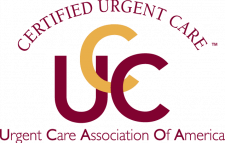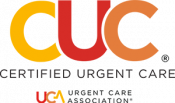The Emerald Coast is a top destination for beach vacations with its sparkling coastline and sunny skies. But fun in the sun can sometimes lead to unexpected injuries.
From jellyfish stings and sunburn to twisted ankles or coral scrapes, beach injuries can happen fast, but knowing how to respond can make all the difference.
At Emerald Coast Urgent Care, we treat locals and visitors who experience common beach injuries. Whether swimming, surfing, or just relaxing on the sand, a few simple beach safety tips can help you stay safe and know when to seek medical care if needed.
Continue reading to learn more.
Common Beach Injuries
Spending time by the ocean is relaxing, but the sand and surf come with their own set of risks.
Here are some of the most common injuries we treat during beach season:
- Jellyfish stings.
- Foot or ankle injuries from uneven terrain or buried objects.
- Sunburn and heat exhaustion.
- Coral scrapes or shell cuts.
- Dehydration and dizziness.
- Swimmer’s ear or sinus pressure after prolonged water exposure.
- Sand in the eye or skin irritation.
What to Do for a Jellyfish Sting
Jellyfish stings are one of the most frequent complaints we see. Symptoms range from mild redness and pain to more severe allergic reactions.
If stung:
- Rinse the area with saltwater (not fresh water).
- Remove any tentacles with tweezers or the edge of a credit card. Wear gloves or use a cloth if possible.
- Soak or rinse with hot water (not scalding) for 20–45 minutes to reduce pain.
- Avoid rubbing the area or using ice directly on the sting.
If the pain is severe, the sting covers a large area, or you experience swelling, difficulty breathing, or nausea, you should visit Emerald Coast Urgent Care.
Foot, Ankle, and Shell Injuries
Stepping on sharp shells, coral, or hidden beach debris can lead to cuts, sprains, or fractures. Walking barefoot or running in sand increases the risk of twisting an ankle or straining a muscle.
Seek urgent care if:
- Bleeding doesn’t stop, or the wound appears deep.
- There’s significant swelling or bruising.
- You can’t put weight on your foot or ankle.
- You notice redness, warmth, or pus (signs of infection).
Our clinics can clean wounds, provide onsite X-rays, and offer tetanus boosters or antibiotics.
Sunburn and Heat Exhaustion
Sunburn can sneak up on you, especially with ocean breezes masking the heat. Heat exhaustion is also a risk after prolonged sun exposure and dehydration.
Warning signs include:
- Red, blistered, or peeling skin.
- Nausea, dizziness, or fainting.
- Headache or rapid heartbeat.
- Cold, clammy skin despite being in the sun.
Mild sunburn can be treated at home, but moderate to severe cases, especially with blistering or heat-related symptoms, should be seen by a medical provider.
Beach Safety Tips to Follow
Make the most of your vacation with these beach safety tips:
- Swim near lifeguards and observe posted warnings or flag systems.
- Stay hydrated and drink water frequently.
- Apply sunscreen every 2 hours and after swimming.
- Wear protective footwear to avoid sharp shells or hot sand.
- Watch for marine life like jellyfish or stingrays. Shuffle your feet when wading.
- Know your limits in the ocean. Rip currents can be dangerous even for strong swimmers.
- Keep an eye on children at all times, especially near the water.
A little preparation can go a long way in preventing accidents and helping you enjoy your time on the coast.
Walk In for Beach Injury Care in Destin, Panama City Beach, or Inlet Beach
Whether you’re a visitor with a jellyfish sting or a local dealing with a beach-related injury, Emerald Coast Urgent Care is here to help. Our clinics offer:
- Walk-in availability 7 days a week from 9 a.m. to 8 p.m.
- Fast, professional care for minor injuries, allergic reactions, sunburn, and more.
- Three convenient locations in Destin, Panama City Beach, and Inlet Beach.
Don’t let a minor mishap ruin your day at the beach. Call or walk into a location near you for quick care so you can get back to enjoying the coast.




